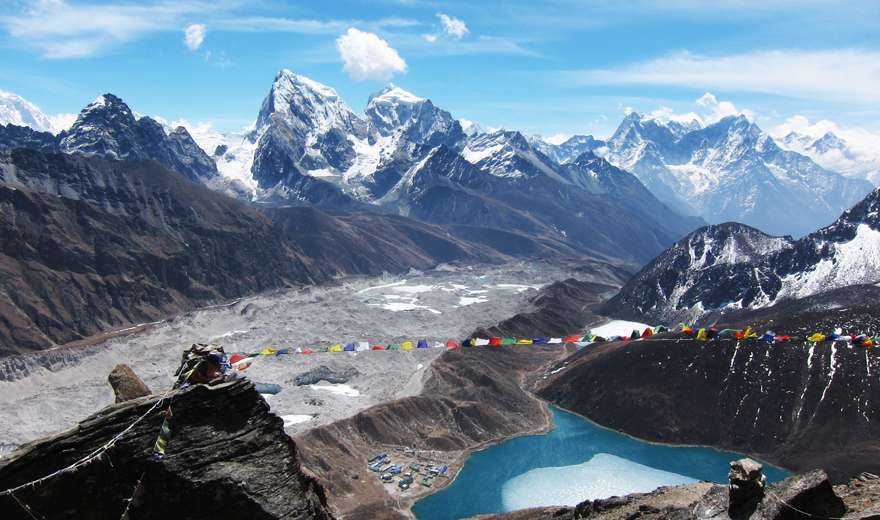By Dev Kumar Sunuwar
Every year on 27 September, ‘World Tourism Day’ is commemorated worldwide to foster awareness among the international community of the importance of tourism and its social, cultural, political, and economic value. This year, tourism has been among the hardest hit of all sectors by the COVID-19 pandemic. However, the theme of the 2020 edition of international day is "Tourism and Rural Development."
Undoubtedly, the tourism is one of the largest industries in the world. One out of every 10 jobs in the whole world is in the tourism industry and 30 percent of the world revenue comes from tourism. The livelihoods of a very large number of people are linked to the tourism industry. It is one of the lucrative fields to be involved in. "But it is not the easiest thing for Indigenous Peoples to engage in, because the tourism industry is controlled by powerful infrastructures not composed of or controlled by Indigenous Peoples, thus they don’t have benefits", says Ben Sherman, Chairman of the World Indigenous Tourism Alliance, a Indigenous-led global network formed in 2012 by a group of Indigenous leaders involved in tourism.
Indigenous Peoples are the keepers of some of the last undisturbed places on earth, which are attractive to travelers and tourists who are looking for such destinations. Those last best places with pristine lands and waters are occupied by people who have very unique cultures and stories to tell.
Indigenous Peoples are the keepers of some of the last undisturbed places on earth, which are attractive to travelers and tourists who are looking for such destinations. Those last best places with pristine lands and waters are occupied by people who have very unique cultures and stories to tell. There have been serious problems of violation of Indigenous Peoples’ rights and growing exploitation of Indigenous Peoples at tourism destinations and protected areas by tourism business. Tour and travel operators often look for quick and easy profits off of Indigenous communities. Sherman says that it is therefore, when those destinations are marketed, travelers have to know that they can’t exploit those communities, that is the nature of Indigenous tourism.
The tourism industry can bring positive impacts if it is done with proper planning, and proper organizing, proper marketing and tourism product development. An example is Canada which has one of the most advanced systems of Indigenous tourism. Very carefully developed Indigenous tourism strives to abide by certain principles and standards for Indigenous communities so that tourism brings a positive benefit to Indigenous Peoples.
Indigenous Peoples demand respect of their human rights, especially the right to self-determination in tourism. The central principle of Indigenous Peoples’ right to self-determination in tourism is, their right to decide for or against a tourism development and to the degree to which cultural heritage is shared with outsiders.
Indigenous Peoples worldwide are affected by tourism in several major ways. The tourism industry in its constant expansion appropriates Indigenous Peoples land and resources, creating tensions and escalating inequalities. Indigenous Peoples demand respect of their human rights, especially the right to self-determination in tourism. The central principle of Indigenous Peoples’ right to self-determination in tourism is, their right to decide for or against a tourism development and to the degree to which cultural heritage is shared with outsiders. The negative side of tourism lies in travel agencies not owned by Indigenous Peoples. Tour operations like to bring tourists to Indigenous communities and by doing so they tend to exploit Indigenous Peoples. They exploit their cultures, their lands, their food with very little in return to the Indigenous communities. These tour operators don’t live in those communities, so when they leave, they take income with them that they gain from Indigenous tourism, says, Sherman elaborating further, the dark side of tourism for Indigenous Peoples.
According to Ben Sherman, in order to make the tourism industry more beneficial to Indigenous Peoples, a group of Indigenous leaders involved in tourism, formed an international tourism alliance called World Indigenous Tourism Alliance in 2012, by organizing an Indigenous tourism conference in Darwin, Australia. This Indigenous-led global network of Indigenous leaders in tourism is engaged in devising and implementing strategies for the advancement of Indigenous tourism globally and ensuring human rights of Indigenous Peoples in tourism work.
Indigenous Peoples want tourism that is developed to benefit Indigenous communities in a way that helps restore their culture, gain income, and promote the wellbeing of the communities and ultimately make people happy by their contribution".
Traditionally, tourism development has focused on macro-economic benefits—the impact of tourism is most frequently measured in numbers of international visitor arrivals, contribution to employment and to the balance of payments in foreign exchange earnings. But Sherman argues that these have little utility as they cannot be used to measure the impacts of tourism on local economic development in general and poverty reduction in particular. The UN World Tourism Organization supports mass tourism in a way that Indigenous Peoples don’t care for. Ben Sherman says, "there is a need for community-based tourism, which means that Indigenous Peoples want tourism that is developed to benefit Indigenous communities in a way that helps restore their culture, gain income, and promote the wellbeing of the communities and ultimately make people happy by their contribution".
Often when tourists come into communities, Indigenous Peoples don’t have much control over them. Indigenous Peoples should have meaningful engagement in the processes of planning and developing tourism which affects them, including accepting when they just say no. Sherman recomends, "there is a need to set a ground rules as to how tourists should behave when they come into the communities, because tourists bear a duty to respect destination communities, while the service providers such as tour operators also have responsibilities to recognize and respect the rights of Indigenous communities, and need to foster harmonious partnership".
Also listen program here: https://rights.culturalsurvival.org/tourism-and-its-impact-indigenous-peoples-interview-ben-sherman
